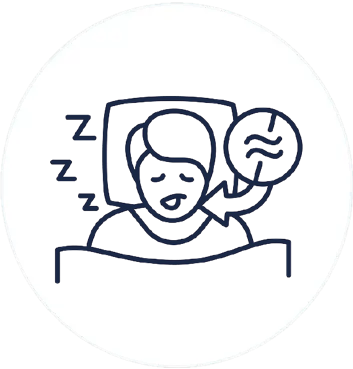The laser snoring procedure called Nightlase has been shown to reduce or stop snoring and can also help with sleep apnea. Snoring is a common conditionthat occurswhen airflow through the mouth and nose is partially obstructed during sleep. This obstruction can lead to the vibration of tissues in the throat, producing the characteristic sound of snoring.While snoring is often considered a nuisance, it canalsosignal underlying health concerns, such as sleep apnea, and negatively affect sleep quality forboththe individual and their partner.
Causes of Snoring
Snoring can be caused by a variety of factors, including:
- Nasal Congestion:Allergies, colds, or structural issues like a deviated septum can obstruct airflow through the nasal passages.
- Throat Anatomy:Enlarged tonsils, a thick soft palate, or a long uvula can narrow the airway, increasing the likelihood of snoring.
- Age:As people age, the throat becomes narrower, and muscle tonein the throatdecreases, making snoring more likely.
- Lifestyle Factors:Alcohol consumption, smoking, and the use of sedatives can relax throat muscles, contributing to airway obstruction.
- Sleep Position:Sleeping on the back allows the tongue and soft tissues to fall backward, partially blocking the airway and leading to snoring.
Effects of Snoring
While snoring may seem harmless, it can have significant impacts, including:
- Disrupted Sleep:Frequent interruptions can reducethe quality of sleepfor both the individual and their partner.
- Daytime Fatigue:Poor sleep quality due to snoring can result in excessive daytime sleepiness,impactingproductivity and overall well-being.
- Relationship Strain:Snoring can create tension between partners, particularly if the noise consistently disrupts sleep.
- Health Risks:In some cases, snoring may indicate sleep apnea,a serious condition thatcan lead to long-term health issues if untreated.
Treatment Options for Snoring
Several approaches can help manage or eliminate snoring, depending on its underlying cause:
- Lifestyle Changes:Losing weight, avoiding alcohol before bedtime, and sleeping on your side can help reduce snoring.
- Oral Appliances:Custom-fitted dental devices, similar to mouthguards, can reposition the jaw and tongue to keep the airway open during sleep.
- Continuous Positive Airway Pressure (CPAP):A CPAP machine delivers air pressure to keep the airway open, especially incases involving sleep apnea.
- Laser Treatments:Procedures like Nightlase tighten and tone the tissues in the throat, reducing vibrations that cause snoring.
- Surgical Interventions:In severe cases, surgery may be recommended to remove or adjust tissues obstructing the airway.
Sleep Apnea
Sleep Apnea is one of the most commonly occurring sleep disorders affecting both children and adults. A person suffering from sleep apnea has abnormal breathing during their sleep. They stop repeatedly breathing during their sleep, resulting in the body and brain not getting enough oxygen. When they restart breathing, they may snort or awaken completely with gasping, smothering, or choking sensations. If left untreated, sleep apnea may cause health issues such as hypertension, stroke, heart failure, and diabetes.
What causes Sleep Apnea?
- People with a family history are more likely to suffer from obstructive sleep apnea.
- Obesity is also one of the leading reasons for sleep apnea as it contributes to the airway's narrowing.
- The airflow is also directly affected by the size and positioning of a person's neck, jaw, tongue, and other tissues near the throat.
- The use of sedative medicines can cause tissue in the throat to relax, making it easier for the airway to become obstructed.
- Heavy smoking can also be one of the contributing factors to sleep apnea.
- Sleeping on your back makes it easier for tissues to collapse around the airways, causing blockages.
What are the symptoms of Sleep Apnea?
- A person suffering from sleep apnea will awake to gasp for air during sleep.
- It may cause excessive daytime sleepiness.
- Sleep apnea patients suffer from insomnia.
- One can experience difficulty in concentration leading to irritability.
- Morning headaches can be a common occurrence.
- You may wake up from your sleep with a dry mouth.
- Loud snoring is another indicator of sleep apnea.
- A person may stop breathing suddenly during sleep.
What are the three kinds of Sleep Apnea?
- Obstructive sleep apnea: This kind of sleep apnea occurs when there is a physical blockage in the airways at the back of the throat, causing temporary lapses in the breath.
- Central Sleep Apnea:It occurs when there is an issue with the brain's system, which controls the muscles involved in respiration. It may result in slow and shallow breathing.
- Mixed Sleep Apnea:Complex or mixed sleep apnea occurs when a person is suffering from obstructive and central sleep apnea.
What is the role of dentistry in treating Sleep Apnea?
Dentists play a valuable role in treating Sleep Apnea. A person diagnosed with sleep apnea can consult a dentist and learn of the various options available to treat the same. Your dentist may recommend an oral appliance. These appliances can help ease mild to moderate sleep apnea symptoms.
The oral device looks and functions are similar to a mouth-guard. When a patient wears it during sleep, the device helps in preventing the obstruction of the airway. It is created to hold the lower jaw forward during sleep. This shifting of the jaw moves the tongue away from the back of the throat, reducing the risk of obstruction. A dentist can help fabricate, fit, adjust, monitor, and treat oral appliance treatment complications. This remedy based on scientific evidence should be first undergone before moving onto more complex procedures. Surgery should be the last option.
Call us at West Valley Natural Dentistry or schedule an online appointment to know more about Sleep Apnea.
